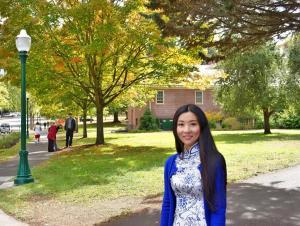Peer-reviewed Journals
1. Jing-Schmidt, Z., Lang, J., Shi, H. H., Hung, S. H., & Zhu, L. 2022. “Aspect construal in Mandarin: A usage-based constructionist perspective on LE” Journal of Linguistics,60. (Forthcoming)
2. Wang, H., Shi, H. H. (co-first author), & Jing-Schmidt, Z. (2021). Affective stance in constructional idioms: A usage-based constructionist approach to Mandarin [yòu X yòu Y]. Journal of Pragmatics, 177, 29–50. (https://doi.org/10.1016/j.pragma.2021.02.004)
3. Jing-Schmidt, Z., Lang, J., Hung, S. H., Shi, H. H., and Liu, S. X. 2021. “Oh, the things that smell! A corpus study of olfactory metaphors in English” Cognitive Linguistics. (Accepted)
4. Shi, H. H., & Jing-Schmidt, Z. (2020). Little cutie one piece: An innovative human classifier and its social indexicality in Chinese digital culture. Chinese Language and Discourse, 11(1), 31–54. (https://doi.org/10.1075/cld.00023.shi)
Book Chapters
5. Shi, H. H., Liu, S. X. & Jing-Schmidt, Z. (2020). Manual Action Metaphors in Chinese: A Usage-Based Constructionist Study. In Corpus-based Research on Chinese Language and Linguistics [Sinica Venetiana] (1.0, Vol. 6, pp. 125–143). Fondazione Università Ca' Foscari Venezia, Italia. (https://doi.org/10.14277/978-88-6969-406-6/004)
Conference Papers
6. Shi, H. H. (2021). Méi: An innovative human classifier and its social indexicality in Chinese digital culture. Proceedings of the 17th International Pragmatics Conference, Winterthur, Switzerland (p.161). https://cdn.ymaws.com/pragmatics.international/resource/collection/3960B891-EE4B-4DB1-A7F5-47C668E86C8D/Abstracts_book_-_Winterthur_IPrA2021.pdf
7. Shi, H. (2019). Comparing L1 and L2 Chinese vowels: A pilot study of linguistic training in the language classroom. Proceedings of ACTFL 2019 Annual Convention and World Language Expo, Washington DC, USA. https://www.actfl.org/convention-and-expo
8. Jing-Schmidt, Z., Hung, S. H., Lang, J., Shi, H. H., Zhu, L. (2019). Bridging usage-based theory, corpus research, and grammar teaching: An innovative approach to le. Proceedings of 2019 CLTA Annual Conference at Seattle, WA, USA (p.15). https://clta-us.org/wp-content/uploads/2019/03/2019-CLTA-Annual-Conference-Program.pdf
9. Shi, H. (2018). The diminished online persona: A semantic change of Chinese classifier méi on Weibo. Proceedings of the 20th International Research Conference, Paris, France August 27-28, 2018, 20 (8), Part XVII: 2096. https://attachments.waset.org/downloads/books/Paris-France-Aug-27-28,--2018,-20-(8)-Part-XVII.pdf
10. Jing-Schmidt, Z., Peng, X., Shi, H., Zhu, L. (2016). Teaching Chinese collocations: integrating vocabulary and grammar in CSL. Proceedings of 2016 ACTFL Annual Convention and World Language Expo at Boston Convention and Exhibition Center, Boston, MA, USA (p. 16). https://clta-us.org/wp-content/uploads/2010/01/2016-CLTA-Annual-Meeting-Program-11-11-2016.pdf
11. Jing-Schmidt, Z., Peng, X., Zhu, L., Shi, H. (2016). Usage-based constructionist theory and task-based Chinese language teaching. Proceedings of the 2nd CLTA International Symposium on Chinese Language Teaching and Learning, College Park, MD, USA (p.44). http://clta-us.org/wp-content/uploads/2016/03/CLTA-S2-Program_Full-v.8.8-final-with-maps.pdf

